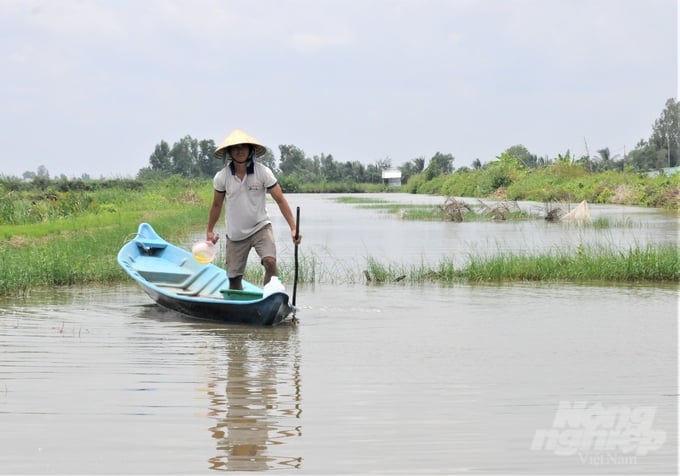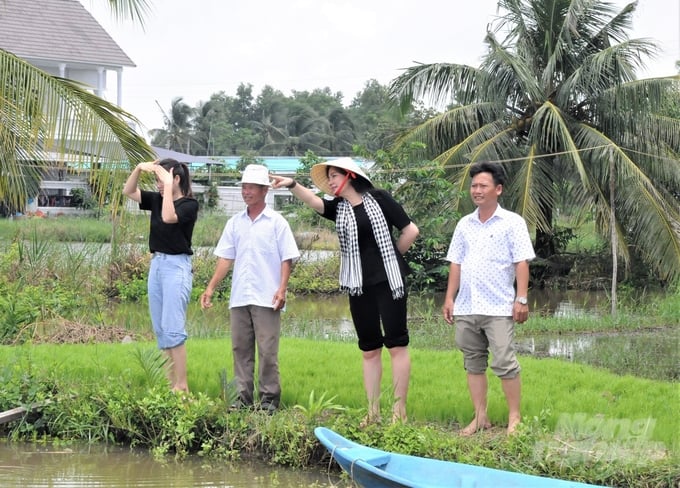June 25, 2025 | 05:39 GMT +7
June 25, 2025 | 05:39 GMT +7
Hotline: 0913.378.918
June 25, 2025 | 05:39 GMT +7
Hotline: 0913.378.918
Ms. Nguyen Thi Hong Diep, Head of the Agricultural Extension Station in An Minh District, Kien Giang province, stated that the district is implementing a project for multi-species aquaculture in 2023. The project encompasses various species including tiger shrimp, white leg shrimp, giant freshwater prawn, and sea crab, and utilizes Bo De Mother Water biological product for water treatment during the farming process. The implementation area covers 500 hectares across five communes in the district, with an additional 60 hectares allocated to the communes of Dong Hung and Van Khanh Dong, which are currently undergoing rural development, for the simultaneous production of giant freshwater prawn and rice.

Farmers in An Minh District utilizes the Bo De Mother Water biological product to treat the water environment for shrimp farming, resulting in reduced investment costs, increased productivity, and enhanced shrimp quality. Photo: Trung Chanh.
Assessments have revealed that the use of the Bo De Mother Water biological product is highly effective in water treatment, resulting in clear and clean water conditions. It also enhances the breeding process for shrimp with high survival rates and rapid growth. The symbiotic relationship between shrimp and rice creates a favorable environment for both subjects, thereby reducing investment costs and increasing income for farmers on the same production area.
The majority of farmers in Thanh Phung Tay Hamlet, Dong Hung Commune, An Minh District highly regards the effectiveness of the Bo De Mother Water biological product in water treatment for shrimp and rice farming. The product features accessibility and low initial investment costs, resulting in improved shrimp farming productivity and quality, and ultimately increased profits.
Mr. Nguyen Hoang Vinh, a farmer from Tan Phung Tay Hamlet with 4 hectares of shrimp-rice integrated farming, including 2 hectares of program-supported production area. Mr. Vinh shared that each shrimp farming cycle in the past required the purchasing of lime powder, probiotics, and Zeo for water treatment, which amounts an average of 10 million VND per hectare. However, the Bo De biological process has reduced this cost to approximately 5 million VND per hectare, resulting in significant cost savings. Furthermore, farmers can maximize labor efficiency thanks to the accessibility of the Bo De Mother Water biological product. Accordingly, farmers only need to dilute the product in water and apply it throughout the entire production area. Farmers may repeat this procedure every 15 days to maintain an ideal water environment for shrimp farming.
An Minh district is a focal point for shrimp-rice integrated farming in Kien Giang province. In addition to shrimp farming in brackish water, farmers often cultivate tiger shrimp, white leg shrimp, and sea crabs. Subsequently, farmers will combine cultivating rice and giant freshwater prawn in the same area.
To help farmers adjust their production habits, An Minh district's Department of Agriculture and Rural Development partnered with the Bo De Group to support the use of the Bo De Mother Water biological product for water treatment in shrimp farming. As a result of this collaboration, farmers receive a 50% subsidy for the Bo De Mother Water product, with an application rate of 80 liters per hectare per crop cycle.

Ms. Nguyen Thi Hang, General Director of Bo De group (second from right), and local farmers in An Minh district conducting an inspection and assessment of the effectiveness of Bo De Mother Water biological product as a water treatment measure in shrimp-rice integrated farming model.
Mr. Le Hoang Chan residing in Thanh Phung Tay hamlet, Dong Hung commune, manages a two-hectare shrimp-rice integrated farming operation. After successfully harvesting a crop of tiger shrimp and whiteleg shrimp, he transitioned to cultivating giant freshwater prawns in combination with rice. Mr. Chan attests to the remarkable effectiveness of the Bo De Mother Water biological product during the nursery phase of giant freshwater prawn breeding. Following two months of nursery within the nursery ponds, he commenced releasing the prawns into the rice fields. The survival rate of these prawns exceeded 80%, a notable improvement compared to the previous range of 60 to 70%.
Furthermore, Mr. Chan employed Bo De Mother Water as a water treatment measure during his recent freshwater prawn crop. After detecting early signs of red-body syndrome among the prawns, he promptly administered Bo De Mother Water throughout the culture ponds. Accordingly, he noted a significant containment of the disease, signs of recovery among the affected prawns, and a successful harvest. This stands in stark contrast to the past, where prawns afflicted with red-body syndrome were often considered incurable.
Ms. Nguyen Thi Hang, General Director of Bo De group, regards Mr. Chan's proactive approach in identifying and addressing the disease as fortuitous. She emphasizes the groundbreaking nature and efficacy of Bo De Mother Water as a biological product. The utilization of Bo De Mother Water, she asserts, enhances water quality by elevating dissolved oxygen levels and mitigating the proliferation of disease carriers. This results in a healthy environment which enables the shrimps to overcome diseases and continue their growth, ultimately leading to successful harvests.
Translated by Nguyen Hai Long
/2025/06/17/3942-2-143243_548.jpg)
(VAN) Recently, in Sweden, the Secretary of the Binh Dinh Provincial Party Committee presented the Investment Registration Certificate for the 'Polyester Fabric Recycling Complex' project to SYRE Impact-AB Company.
/2025/06/12/3721-2-202745_83.jpg)
(VAN) TH made an impression at Seoul Food 2025 with its line of natural beverages, paving the way for Vietnamese food products to enter the South Korean market.

(VAN) Soc Trang's success in rice exports stems from a strategy of developing fragrant and specialty rice cultivation areas and standardizing production toward low-emission practices.
/2025/06/11/1311-5-120811_839.jpg)
(VAN) The pig farming industry is facing the challenge of comprehensive restructuring to meet requirements for quality, safety, traceability, and market expansion both domestically and for export.

(VAN) Vietnam considers participating in ALGROALBA in order to expand agricultural production, coordinate the assessment and effective exploitation potential land.
/2025/06/05/5314-1-184727_407.jpg)
(VAN) From seemingly worthless fish scales and skin, enzymes and lactic ferments can transform by-products into peptides, opening a sustainable, effective business direction and elevating Vietnamese seafood.

(VAN) TTC AgriS and IFC signed a strategic partnership to develop a sustainable agricultural value chain, aiming to achieve the Net Zero target by 2035.